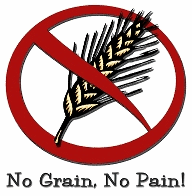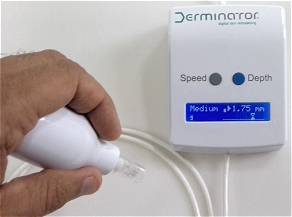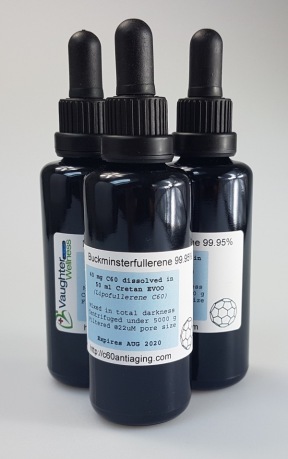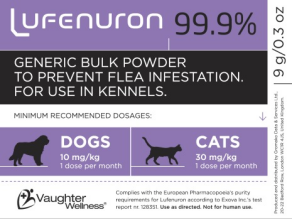
Bread, our daily poison (Gluten sensitivity mistaken for Candida)
 I wrote this article for people with symptoms that are often misinterpreted as Candida infection, but are in fact are caused by non-Celiac gluten sensitivity (NCGS). Of course, people with such symptoms should not purchase Lufenuron from us, but go on a gluten-free diet instead.
I wrote this article for people with symptoms that are often misinterpreted as Candida infection, but are in fact are caused by non-Celiac gluten sensitivity (NCGS). Of course, people with such symptoms should not purchase Lufenuron from us, but go on a gluten-free diet instead.
It is estimated that at least one in six people are non-Celiac gluten intolerant. Common symptoms are bloating, gas and/or abdominal pain, diarrhea or constipation, irritable bowel syndrome, hard to flush bulky, fatty stools, bloating after meals or waking up bloated, itchy skin rash or eczema, discolored teeth or loss of enamel, aching joints, fatigue, canker sores, mood swings, anxiety, depression, poor appetite, weight loss or weight gain, ringing in your ears, headaches or migraines, muscle weakness, low sex drive, poor concentration and/or memory problems, infertility and/or irregular menstrual cycles. Long term, more serious consequences of gluten exposure in sensitive individuals can be degenerative organ damage, autoimmune diseases, osteoporosis and cancer.
Wheat, barley, rye and oats contain toxic chemicals produced by the plant itself. These wheat-poisons have evolved to help the plant with its own reproduction and survival, at the expense of the animal that eats its seed.
Conservative estimates say that one in seven people have some form of gluten intolerance. Most do not have Celiac disease, and many are asymptomatic, meaning they do not have clear Celiac-like symptoms. The astonishing and worrying fact is that roughly 80% of Western people's immune systems react to gluten with the production of IgM and IgG antibodies in what is called the "innate immune response". The innate immune system predates, evolution-wise, the antibody-producing "adaptive immune system" and nonspecifically defends against pathogens.
Gliadin is now ("controversially") known as a toxic wheat glycoprotein, used by the plant to make gluten. In a study published in GUT in 2007 a group of researchers asked themselves the question: "Is gliadin really safe for non-Coeliac individuals?". To test the hypothesis that an innate immune response to gliadin is common in patients with Celiac disease and without Celiac disease, intestinal biopsy cultures were taken from both groups and challenged with crude gliadin, the gliadin synthetic 19-mer (19 amino acid long gliadin peptide) and 33-mer deamidated peptides. Results showed that all patients with or without Celiac disease when challenged with the various forms of gliadin produced an interleukin-15-mediated response. The researchers concluded: "The data obtained in this pilot study supports the hypothesis that gluten elicits its harmful effect, throughout an IL15 innate immune response, on ALL individuals."
There can be only one reason why a substance triggers an immune response: It was useful in evolutionary terms, meaning that without the response, the tribe without that response produced less children than the tribe with the response. Usually the reason for that is that the adult members in the tribe without the response die before they manage to fully procreate and raise their offspring. Hence, when your immune system responds to a substance by producing antibodies, this is a serious sign that this substance likely is bad for you. Bread-eaters are unaware that everybody is gluten-intolerant in one way or another - even when there are no noticeable signs, and that gluten are suspected to play a key role in the cause of certain cancers, autoimmune diseases and age-related illnesses such as Alzheimer's.
Let me count the ways how "bread is bad": In some birds as well as Celiac patients, the wheat toxins trigger such a violent inflammatory response in the intestines, that the wheat grain survives the gastrointestinal tract undigested. The benefit to the wheat plant is that its seed ends up viable, in a clot of bird feces - about the most advantageous position to be in, for successful germination. Why does the bird voluntarily subject itself to such a perhaps painful experience? Could it be that it likes the natural opioids the wheat produces? And perhaps those opioids in bread and pasta are the reason why we consider the consumption of these foods to be non-negotiable as a "quality of life" issue?
"Gluten" comes from the Latin. The word "glue" is derived from that same Latin root. "Gluten" means "glues". Indeed, gluten-based glues are a veritable staple of the glue industry. What gives gluten its adhesive and difficult-to-digest qualities are the high levels of disulfide bonds it contains. These same sulfur-to-sulfur bonds are found in hair, nails and vulcanized rubber. The first third of the small intestine is where vitamins and minerals are absorbed by the millions of tiny outgrowths called Villi. The villi greatly increase the surface area of the intestine, so that nutrients can be absorbed in just a few feet of intestinal tract. The slimy gluten however coat the villi as an oil spill would coat a field of sea anemones. Best case, the villi can't absorb the water-soluble vitamins and minerals they should absorb. Worst case, the villi become inflamed and disappear completely. Up to ten million Americans have (mostly undiagnosed) Celiac disease, another thirty million are gluten sensitive, and yet the FDA has put gluten on the GRAS-list ("Generally Recognized As Safe"). Therefore, ketchup and ice cream with added gluten does not need to mention gluten content. Less than 0.1 grams of gluten can cause severe problems in a Celiac patient.
 A person - any person - who eats bread or pasta on a daily basis constantly has his or her small intestine coated with slimy, inflammatory gluten-glue, and serious vitamin- and mineral deficiencies are the result. These deficiencies usually take many decades to express themselves as Osteoporosis, Diabetes and certain forms of cancer. Societies such as Japan with a traditionally gluten-free diet have very much lower occurrences of a wide variety of diseases, in spite of the fact that these people usually eat a lot of fish, polluted with everything from PCB's to heavy metals.
A person - any person - who eats bread or pasta on a daily basis constantly has his or her small intestine coated with slimy, inflammatory gluten-glue, and serious vitamin- and mineral deficiencies are the result. These deficiencies usually take many decades to express themselves as Osteoporosis, Diabetes and certain forms of cancer. Societies such as Japan with a traditionally gluten-free diet have very much lower occurrences of a wide variety of diseases, in spite of the fact that these people usually eat a lot of fish, polluted with everything from PCB's to heavy metals.
It turns out that Celiac disease is not a disease at all, but a well-functioning early warning system. In addition to the innate immune response to wheat that we all have, Celiacs have an additional, genetically determined, adaptive response. Whereas non-Celiacs go on consuming wheat and develop cancer, MS and a plethora of other very serious illnesses, Celiacs simply avoid gluten and stay healthy. Celiacs don't have a faulty immune system, non-Celiacs do. When people started to eat wheat as a matter of increasing necessity, only those with genetically suppressed adaptive responses to gluten remained alive to procreate. But those individuals only have debilitated immune systems. They are not at all impervious to gluten's damaging properties.
It's not just the gluten that are bad for you. Wheat is a veritable bio-weapon. Chemical warfare is wheat's middle name. Toxic oxalates, lectins and phytates, insidious trypsin- and alpha-amalyase inhibitors, and endocrine disrupters such as estrogens. Wheat grains are unwholesome indeed. Not even cows can digest them without the risk of severe intestinal problems and liver abcesses.
"But European humanity has been been eating bread since time immemorial!" you may say, incredulously. Well, no. From archeological evidence we know that bread was invented at most 14 thousand years ago. Most estimations say between 10 000 and 12 000 years. And most Western societies were introduced to bread many millennia later. That is a blink of an eye in evolutionary terms. Humans have been genetically unchanged for the past 200 000 years. We are genetically still mainly hunter-gatherers and sandwiches and spaghetti are not part of such a diet. Bread is the product of the age of agriculture, which directly spawned the industrial revolution. Humans did not have time to adapt to the slow-acting poisons in wheat. Wheat is a monocotyledonous (one-leafed) grass, something humans, nay, mammals have never eaten in their entire evolutionary history. No wonder they have no defence against its phyto-chemical toxins.
Wheat Germ Agglutinin (WGA) is glycoprotein classified as a lectin and is known to play a causative role in kidney disease, such as IgA nephropathy. In the article: "Do dietary lectins cause disease?", allergist David L J Freed points out that WGA binds to "glomerular capillary walls, mesangial cells and tubules of human kidney and (in rodents) binds IgA and induces IgA mesangial deposits," indicating that wheat consumption may lead to kidney damage in susceptible individuals.
 And sure enough, there is research that shows that wheat can indeed cause kidney cancer. A study from the Mario Negri Institute for Pharmacological Research in Milan Italy published in 2007 in the International Journal of Cancer looked at bread consumption and the risk of malignant kidney tumors. They found that those who consumed the most bread had a 94% higher risk of developing kidney cancer compared to those who consumed the least bread. Given the inherently toxic effect that WGA obviously has on kidney function, it is possible that in certain genetically predisposed individuals the body - in its innate intelligence - has to choose between continuing to allow damage to the kidneys (or possibly other organs) until kidney failure and rapid death result, or launch an autoimmune attack on the villi to prevent the absorption of the offending substance which results in a prolonged though relatively malnourished life.
And sure enough, there is research that shows that wheat can indeed cause kidney cancer. A study from the Mario Negri Institute for Pharmacological Research in Milan Italy published in 2007 in the International Journal of Cancer looked at bread consumption and the risk of malignant kidney tumors. They found that those who consumed the most bread had a 94% higher risk of developing kidney cancer compared to those who consumed the least bread. Given the inherently toxic effect that WGA obviously has on kidney function, it is possible that in certain genetically predisposed individuals the body - in its innate intelligence - has to choose between continuing to allow damage to the kidneys (or possibly other organs) until kidney failure and rapid death result, or launch an autoimmune attack on the villi to prevent the absorption of the offending substance which results in a prolonged though relatively malnourished life.
The real culprit is of course the wheat, not the "inferior genes". Because wheat is not food for humans. It is toxic in a wide variety of ways, and only suitable to be used for the production of industrial glues. The fact that you don't notice anything untoward when eating gluten doesn't mean nothing bad is going on in your body. Why isn't this a widely known fact? One reason is that PhD's never see any patients and MD's never do any fundamental research, and there is little cross-pollination between disciplines. Besides - proclaiming that macaroni kills people by rotting their organs is not exactly beneficial to one's scientific career. Fact is, we haven't identified half of the all the bad stuff wheat contains yet. Many years of selective breeding has increased wheat's genome to more than 5 times larger genetic size than the human genome! Common bread wheat (Triticum aestivum), for instance, has so far almost 24,000 proteins catalogued. One single "bad" protein can wreak havoc anywhere in the body, over the years. Big Agrobusiness, like the tobacco industry, are of course already aware of the health problems their product causes, and are feverishly completing their Wheat Genome Project, to aid them in identifying the main disease-causing part of the wheat DNA so that they can remove them. This will avoid a looming legal liability and add Celiac patients and gluten-intolerants to their market. There is much more to explain about the damaging, sick-making properties of wheat, but that has to wait for another time. Wheat causes damage to the intestines. Wheat causes intestinal permeability. Wheat has pharmacologically active properties such as estrogens that are detrimental to health. Wheat causes damage to many organs in the body, including the brain. Wheat contains high concentrations of excitotoxins such as aspartates and glutamates.


 Dermaneedling for Alopecia
Dermaneedling for Alopecia What you need for dermaneedling your skin issues
What you need for dermaneedling your skin issues See how competing devices cause skin microtearing
See how competing devices cause skin microtearing Copper peptides for dermaneedling
Copper peptides for dermaneedling Dermarolling explained
Dermarolling explained How dermaneedling works
How dermaneedling works
 Psychological aspects of stretchmarks and the beauty cult
Psychological aspects of stretchmarks and the beauty cult Dermaneedling side effects?
Dermaneedling side effects? Stretchmarks: Single needle before and after
Stretchmarks: Single needle before and after
 What to do about Cellulite?
What to do about Cellulite? Dermaneelding: Hype vs. reaslistic results
Dermaneelding: Hype vs. reaslistic results Progress pics: Acne scars, stretchmarks, pigmentation
Progress pics: Acne scars, stretchmarks, pigmentation SkinPen review: Deceptive advertising!
SkinPen review: Deceptive advertising!





